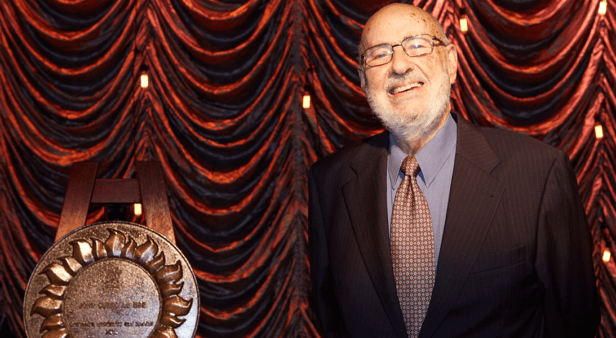First of all, congratulations on being named a Queensland Great for 2016! How does earning an award like this feel for you?
You know what this is like, this sort of thing – if you work away and do your best and somebody suddenly comes along and say ‘you’ve been awarded this’, it’s always marvellous to think that someone has taken notice. It’s good because the organisation I work for, in this case the Queensland Youth Orchestra, becomes a little bit more acceptable in the public eye and maybe more attractive to sponsors and so on. It’s an all round wonderful thing, it really is.
Could you take me back to where your love of music came from – were you a musical whiz kid from an early age?
I grew up in Cairns and my ambition in life was to play cricket – that’s what I wanted to do for a living and wanted to play for Australia. I wasn’t too bad at it at all, really. My parents got me to learn the violin when I was quite young and I hated it and wouldn’t practise – all I wanted to do is play cricket. I must have had a little bit of musical aptitude hidden away somewhere but at the time I wasn’t interested.
Do you remember when your passion for music ignited?
I can remember almost to the moment, and you’ll be surprised at the answer. After high school I went to university to study architecture because my parents insisted I take a profession, so the cricket thing faded a bit but music wasn’t there at all by that time. I used to play tennis every Sunday morning with a pretty good friend of mine who was interested in music. He told me one Sunday that the great violinist Alfredo Campoli was coming to play tennis with us. I didn’t know who he was and I was told he was a great violinist – my question was “Can he play tennis?” Anyway, Mr Campoli said to me “Ah, Johnny! I’ve been told you are a violinist as well!”. I said not at all and that I only played when I was young, but he gave me some tickets to his show to the Queensland Symphony anyway. My friend said I had to go because the day after when he comes back to play tennis again he is going to ask how you enjoyed his playing. So I went, and as soon as he started playing – it was a Mendel concerto, I’ll remember it until the day I die – I was inflamed with the desire to play the violin again.
At what point did the passion turn into a fully fledged career?
Well, I wanted to play desperately and I even told my parents that I wanted to stop my university course and start studying the violin seriously. They said no way and that I had to finish my course. I got my architecture degree and then went overseas to study violin, telling my parents I needed money to go over and look at the great architectural masterpieces of Europe. I used up the money on violin lessons and as soon as my father realised where I was – Austria instead of in Rome working in an architecture firm – he stopped my money! So I had to go back to Rome after about nine or ten months. I came back to Australia eventually and I continued being an architect for a while, but my need to get out was so strong I gave the practice to my partners. I did an audition for the QSO and passed, so I started to earn my living as part of the Queensland Symphony Orchestra. When I think about it, everything was kind of accidental – it was very extraordinary.
The Queensland Youth Orchestra that you helped start in 1966 happened almost by chance as well, yes?
Oh, you know that? Yes! I got a call from a friend who was president or chairman of the Secondary School Music Teachers Association and he said that the government doesn’t consider music in schools as a very good prospect. It wasn’t funded and only the private schools do it. I was asked to help put together an orchestra of secondary school students. I said sure – I didn’t know much about conducting but we put the an orchestra together of about 86 players from all the secondary schools we visited around Brisbane. We did a one-off concert and afterward a group of children came along and said that it was such fun, would I be prepared to keep the orchestra on. That’s how the Youth Orchestra began – 50 years go.
Once the orchestra was up and running and it found its footing, what was your approach to engaging with the youth and helping build an interest in music among them?
Well the first thing I did was consult with the principal conductor of the QSO at the time, who was a brilliant conductor from the US called Ezra Rachlin. I was a terrible conductor, the orchestra was going nowhere and I didn’t know anything about running it then, so I asked if he would help me and he said he’d be delighted. I started having lessons with him and I full realised how bad I was and now I was learning how I could help the orchestra. Ezra advised me to split the orchestra up into two, because the weaker players in the orchestra were holding back the stronger players, who weren’t hanging around because of the arrangement. After the split it went better and better, giving both groups repertoire that I knew that they would like and was going to seem just beyond them but it wasn’t really.
When did you know the process was working?
Eventually we moved into the Concert Hall for our concert series. We eventually started overseas touring – we attended three international festivals, the first of which gave the organisation such incredible impetus because it was audition only. Ten of the best youth orchestras in the world were chosen for this festival and that was a defining moment in the history of the organisation. It’s hard to know how you are going in relation to what might be considered the best European youth orchestras, so the experience was very good – it showed us how we were getting on relative to other groups.
Over the years you’ve done a bit of teaching over the years as well. What is your main piece of advice that you try to instil on your students?
I’ll tell you what is the most interesting thing about the young players today – they all play fantastically better than they played in my generation. Now a lot of youngsters at 12 or 13 can play Tchaikovsky’s violin concerto, which was discarded by the person it was written for as too hard to play. So we have a situation now where we have hundreds and thousands of people that are fabulous instrumentalists, but they are a little bit boring and the reason is that they have never really had a life. When you play an instrument, what you are trying to do is tell an audience how you feel and about your life experiences. If your life experience has been only practicing because you can play the Tchaikovsky concerto when you are 13, all you can show your audience is that you’ve practiced. One of the things I try to instil in my students is to live their life to the full, practice intelligently and show people how you’ve lived your life when you play!
In terms of how things have changed over the years – in your opinion how has the landscape shifted in the Australian arts scene, specifically to classical and orchestral music?
Oh, now we come to the controversial bits! The sad fact is that there is less money for the arts now. The Australia Council has less control of its money since the federal government took over a large slice of its money. As a result, for example, my organisation lost $50,000 a year from the Australia Council. The state government used to fund us to the tune of $100,000 a year, now we don’t have any repetitive funding at all. In an organisation that looks after about 500 youngsters every week, that’s quite a bit of money. That being said – it’s happening all across the board. It’s not just music, it’s everywhere in the arts. It reminds me of a saying that Churchill is credited for, when he asked his advisors and ministers where they should draw funding to help the war effort, they suggested the arts. He said, “Cut the arts budget? If we cut the arts budget, what on earth would we be fighting for?” Anyway, we struggle on and do the best we can because we think it’s in the interest of the youngsters to do that.
You’ve won numerous awards in your career – the Queensland Great award only being the most recent. In your opinion, what has been your career highlight to date?
I was realistic as a late starter. I recognised very quickly two things that were very valuable to me – chamber music and looking after the youth orchestra. You could hardly think of anything better to do with your life, really. Every time I had an offer of a job that might have ‘enhanced’ my ‘career’ I knocked it back. I find it hard to pick a highlight – every time something happens it’s always a highlight. It was wonderful when we got in to the first international festival, it was wonderful when the third festival invited us the host orchestra. It’s been so much fun and so satisfying that I do find it very hard to pick. That’s the thing about music, when you get the bug it’s not curable!
Finally, I’d love to know from where you draw your inspiration in work and life?
I would not be exaggerating to say that my family has been the greatest thing in my life, from every point of view. I’ve got phenomenal children – they are all different and they are all marvellous. They make it easy to love ‘em. Also, my wife – and I hope you don’t mind me raving for a bit here – I’ve been with her for 50 years, as long as I’ve been with the youth orchestra, and she has been a total inspiration to me with what I do and I just couldn’t ask for a better family life. It’s easy to take a short step from that to the 6,000 students that have been through the youth orchestra system since it started. It seems to get more important every year – if you can put a better thought into a child’s head during their difficult years, if you can make them interested in something better than the alternative, then I think you’ve done something worthwhile. I guess I draw my strength from that idea.
The Queensland Great Awards recognise outstanding Queenslanders for their lifetime of dedication and contribution to the development of the state and their role in strengthening and shaping the community. Head to the Queensland Government website to see the full list of winners.

